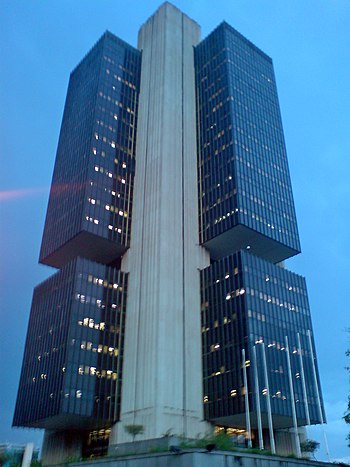 Photo credit: Genghiskhanviet
The Central Bank of Brazil (Portuguese: Banco Central do Brasil) is Brazil's central bank. It was established on December 31, 1964. The Central Bank is linked with the Ministry of Finance. Like other central banks, the Brazilian central bank is the principal monetary authority of the country. It received this authority when it was founded by three different institutions: the Bureau of Currency and Credit (SUMOC), the Bank of Brazil (BB), and the National Treasury. One of the main instruments of Brazil's monetary policy is the Banco Central do Brasil's overnight rate, called the SELIC rate. |